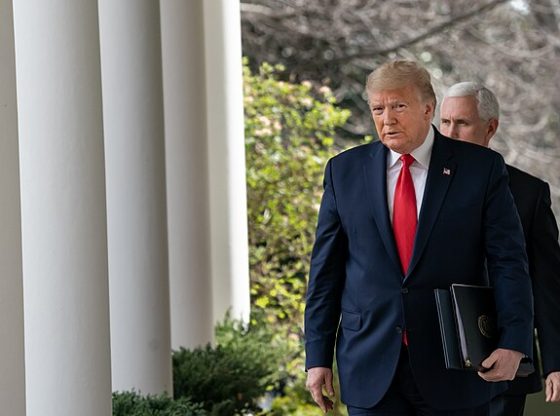Some Chinese officials are reportedly scared of a second Donald Trump presidency – and those fears are not unfounded, experts told the Daily Caller News Foundation.
Privately, the Chinese Communist Party (CCP) officials in question appear to favor a Kamala Harris presidency for a simple reason: they feel that Trump would be more challenging to them, according to a number of officials who spoke to The Wall Street Journal in October. Specifically, Chinese officials are worried that Trump will launch another trade war with China or make unpredictable moves that might rattle diplomatic norms, which caused headaches for Beijing during Trump’s first tenure.
Most experts who spoke to the DCNF largely didn’t take a political approach as to whether Trump or Harris would be more competent in dealing with China, but rather, considered who Beijing is more likely to want to deal with — or not — over the next four years. Those experts said that it is unsurprising that China would be more wary of dealing with a Trump presidency.
“What they know about Donald Trump, which I think is a reasonable estimation, is that Trump 2.0 would be an extension of Trump 1.0 on broad economic policy. That’s a challenge for them,” Steve Yates senior fellow at The Heritage Foundation and former White House national security adviser, told the DCNF. “And with Harris as a presumed continuity [of Biden] … they seem to have seen recent years as relatively smoother for them, in terms of U.S.-China interaction on economics and trade.”
The concerns among officials are largely kept quiet. In public, China maintains a neutral stance toward U.S. elections and says it is open to working with either candidate.
“The presidential elections are the United States’ own affairs,” a spokesperson from the Chinese Embassy in the U.S. told the DCNF. “China has no intention and will not interfere in the U.S. election.”
Behind closed doors, however, Beijing felt better about President Joe Biden before he dropped out of the U.S. presidential race in July, according to officials who spoke to the WSJ. Even though the Biden administration’s relationship with Beijing went through turbulent periods over the last three years, officials felt that Biden was more predictable and less tough on China.
“Under Trump, we had a bad experience,” one senior CCP official bemoaned during a closed-door meeting with U.S. think tanks earlier this year, according to the WSJ.
When Biden dropped out of the race, officials turned their favorability toward Harris, if for no other reason than that they felt she was a better option for them than Trump, according to the WSJ.
“From China as a whole, they don’t see much upside in either candidate … But as far as the regular sort of Chinese officials, from their perspective, they want whichever option is going to be more predictable,” Michael Cunningham, senior fellow at The Heritage Foundation, told the DCNF. “I think most people in the U.S. and in China think [Harris’ approach] would be much more similar to Biden’s policies.”
“There’s a broader range of possibilities if Trump is president, and some of those go in ways that the Chinese Communist Party would really not like,” Cunningham said.
Chinese hackers have now reportedly hacked into U.S. telecommunications networks to tap data on Trump’s phone, as well as his running mate, J.D. Vance, sources with direct knowledge of the matter told The New York Times in a report released Friday. Iran was also implicated in the data hack.
The Trump campaign did not say what potential information, if any, was stolen, but laid blame on Harris for allowing American adversaries to interfere in the U.S. election process.
“This is the continuation of election interference by Kamala Harris and Democrats who will stop at nothing, including emboldening China and Iran attacking critical American infrastructure, to prevent President Trump from returning to the White House,” Steven Cheung, Trump campaign communications director, told the DCNF. “They have now stood by and allowed major foreign adversaries to attack us in order to illegally help Kamala because they know she represents a weak American who will always bow down.”
One point of particular concern about Trump for Chinese officials is that he will launch a second trade war against China in his next hypothetical term. During his first term, Trump — upset that China was exporting more goods to the U.S. than it was importing, creating a trade deficit — imposed sweeping tariffs on China.
Those tariffs raised the price of incoming goods from China. Trump’s goal was to encourage Americans to buy more products domestically and compel China to import more U.S. goods.
China vehemently opposes any sort of tariffs on its exports.
“No one will win a trade war or a tariff war. Restrictions or protectionism will only disrupt normal trade flows and the stability of the production and supply chain, which serves the interests of no one,” the embassy spokesperson told the DCNF.
Tariffs can be tricky because if used recklessly, they could burden Americans with exorbitant costs. But when implemented in the right way, they can also be an incredibly useful tool and help balance the trade scales between the U.S. and China, said Michael Sobolik, author and senior fellow at the American Foreign Policy Council.
“Tariffs are a blunt policy instrument, in that they cause discomfort to U.S. consumers as well as economic pain to Beijing. That said, if leveraged correctly, they could have the added benefit of incentivizing domestic industry to rework their supply chains away from dependency on [China],” Sobolik told the DCNF.
Many of the tariffs imposed under Trump carried over through the Biden administration. But that doesn’t mean Trump won’t impose even further tariffs if he wins a second term; he has already weighed the idea of imposing 60% tariffs on China if elected, which UBS economists have estimated would knock 2.5% off China’s year-by-year GDP growth.
What Trump did with tariffs in his first term means that “there could be something else coming out of the box that no one has thought of, which is completely possible because he did it the first time,” Director of the China Policy Initiative at the America First Policy Institute Adam Savit told the DCNF. “He will have more abled personnel and be better placed to start right out of the gate with creative new policies that can bring different pressure to bear.”
Making matters particularly difficult for China is its faltering domestic economy. China’s GDP is growing at an exponential rate, but is expected to start slowing down substantially within the coming years amid trillions of dollars in debt and a failing property market.
Some Chinese citizens are scrambling to move their assets out of the country. Citizens collectively moved over $250 billion in assets out of China from the last half of 2023 to the first half of 2024; doing so is a difficult task and often involves going through loopholes such as cryptocurrency investment or overpaying for imports.
“[China] knows that they face domestic economic pressures, and if Trump is back in office, they’ll face external economic pressures in the form of tariffs or tough negotiations,” Yates told the DCNF.
China may be more eager to cooperate or negotiate with China given these factors, experts told the DCNF. Aspects of Trump’s “trade war” in his first term worked; the trade deficit initially shrank and the number of Chinese exports to the U.S. dropped, especially in 2020. That changed, however, when the COVID-19 pandemic broke out and the U.S. and other Western nations became reliant on China for certain goods.
Trump is also likely to follow through on his threats — as he has demonstrated before — whereas with Harris, she’s likely to follow Biden’s approach, Savit told the DCNF.
It’s also difficult to know what international trade policies Harris will embrace because she hasn’t clearly articulated many of her policy positions, Yates said.
“With Harris, it’s a blank slate,” Yates told the DCNF. “There’s a few things that have been fed in the course of the campaign, but not very much. [China has] had very superficial interaction with her as vice president. It’s not anything like the negotiating experience of dealing with President Trump.”
The Harris campaign did not respond to a request for comment.
Featured Image Credit: The White House












